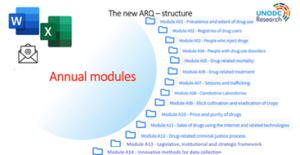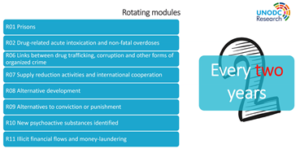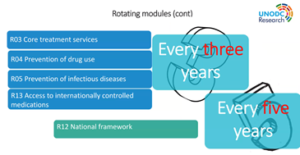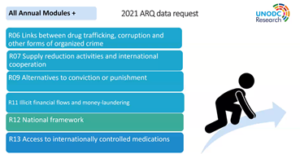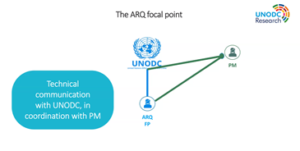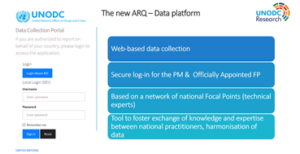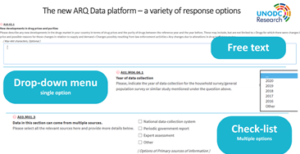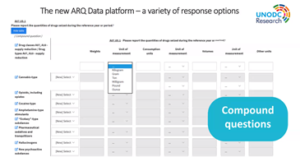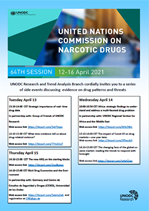Organized by the UNODC Data Development and Dissemination Section
Chair: Enrico Bisogno, Chief of the Data Development and Dissemination Section, Research and Trend Analysis Branch, UNODC
Annual Reporting Questionnaire almost ready to be launched. Long process – since 2017. Last CND we adopted the new ARQ. It’s like when you build a house, you aim to have the most beautiful house. Then you start building… To produce and then share info, but we think it’s more than that.
Francesca Rosa, Statistician – Data Development and Dissemination Section, Research and Trend Analysis Branch, UNODC
Quoting the words of the UN Secretary General: “At the core of our Data Strategy is a simple idea: we start with data action that adds immediate value for our organisation and the people we serve”. We aim to improve the data timeliness and reduce the time to compile the questionnaire and analyse the data. We aim to improve the data – by improving the quality of our questions. Strategic step to improve our data.
New ARQ to be launched in four weeks’ time. Technical assessment of the ARQ contents and process, various online consultations with MS and other stakeholders, two large Expert Group meetings, Coordination meetings with Int/Regional Organisations. Pilot exercise to test draft ARQ à 2020 endorsement by CND 63rd session. CND63 – new ARQ finally endorsed.
Doc endorsed by CND – now written into a questionnaire. Very peculiar year with a lot of challenges [COVID]. Had to find a new way to work together. Develop ARQ Data Collection Platform – a web-based mechanism to manage the ARQ from start to end. Member States can now submit entirely online.
14 new modules:
New ARQ structure: used to be four different parts. Used to be excel sheets that Member States had to download and sent back to us. Now the new version has 14 modules to be completed online. 1-6 are grouped – related to drug demand. 7-11: drug supply. 12-13: in line with traditional questions. 14: innovative methods for data collection.
Rotating modules: every two, three or five years.
This is a list of all annual and rotating modules that will be included in the 2021 questionnaire:
New question classification: to maximise geographical coverage.
- Type I: Basic information (qualitative) – expect all MS to complete
- Type II: on flagship UNODC indicators – what we include in our reports.
- Type III: complementary information/studies.
Officially appoint one partner at national level to quantify information. Permanent Mission (counterparts). PM physically submit. FP Focal Point
There will be coordination at a country level with quality control. The focal point will reassign the module to the most relevant national authorities. There will be a new approach through a international network of experts. This will facilitate exchange of good practices and foster collaboration.
88 countries have already officially appointed the ARQ Focal Point, and their alternate. The UNODC has recently shared a reminder to those Member States who have not yet officially appointed the Focal Point, indicating as deadline to so do by the 20 April 2021.
Screenshot of the new ARQ data platform:
Web-based data collection, secure long-in for the Permanent Mission & officially appoint the Focal Point. Based on a network of national Focal Points.
Q&As:
Germany: thanks for the info so far; so ARQ 2020 still will be conducted in the old form?
A: Next ARQ will be in new format, in new platform. 2021 ARQ is asking about data from 2020, but on the new platform.
China: thanks for your presentation. Will this future ARQ system in 6 official languages?
A: Yes.
China: I am interested to know the way several national agencies can get access to this system and work together to complete respective parts of the ARQ
A: Two national counterparts grant access – this explains the focal points. Up to the permanent mission and focal point to coordinate.
Caitlin Hughes: Thank you very much for the presentation. What data will be captured on alternatives to arrest? And what data will be collected on the national framework?
A: (Angela Me) the module on legislation includes questions on the legislative approach taken by countries to implement the conventions: how substances are placed under national control, how they consider the criminalization of offences, thresholds considered to consider different levels of offences, etc, this include also also questions on whether countries apply alternatives at each stage of the criminal justice system (arrest, prosecution, conviction)
Still partially in development. Will be launched in four weeks time. The FP can see the entire list of modules. You can only see the modules assigned to yourself. If you have to report on prevalence of drug use, the like questional have me grouped together.
Another screenshot:
Variety of response options – checklists, qualitative responses etc
Just an example: a table to be filled in. Used to be called compound questions.
Collated definitions and metadata, to make more comparable between countries and across time. And to allow to expand – e.g. you can add the specific age group to your data, if you have it. Also, possibilities to attach files.
Data life-cycle – begins with the launch of the World Drug Report (WDR). Used to facilitate reporting process. Will make data available in the meantime. The tool is also extremely useful for the launch of the WDR. ARQ is the backbone of the WDR data.
Launch on UNODC Data Day – 12 May 2021. Will be available in 6 UN languages. Hands-on sessions with Member States. Launch platform in advance to give Member States.
